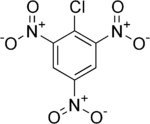Picryl chloride
 | |
| Names | |
|---|---|
| IUPAC name
2-Chloro-1,3,5-trinitrobenzene | |
| Other names
2,4,6-Trinitrochlorobenzene | |
| Identifiers | |
| 88-88-0 | |
| 3D model (Jmol) | Interactive image |
| ChemSpider | 6687 |
| ECHA InfoCard | 100.001.695 |
| PubChem | 6953 |
| UN number | 0155; 3365 (wetted) |
| |
| |
| Properties | |
| C6H2ClN3O6 | |
| Molar mass | 247.55 g/mol |
| Hazards | |
| R-phrases | R2 R26/27/28 R50/53 |
| S-phrases | S28 S35 S36/37 S45 S60 S61 |
| Explosive data | |
| Detonation velocity | 7,200 m/s |
| Except where otherwise noted, data are given for materials in their standard state (at 25 °C [77 °F], 100 kPa). | |
| | |
| Infobox references | |
Picryl chloride is an explosive also known as 2-chloro-1,3,5-trinitrobenzene or 2,4,6-trinitrochlorobenzene (TNCB). Its empirical formula is C6H2ClN3O6. Its detonation velocity is 7,200 m/s.
Chemistry
Picryl chloride is known to have formed crystals such as that of the picryl chloride and hexamethylbenzene in a 1:1 ratio, forming orthorhombic, orange-yellow crystals.[2]
References
- ↑ 2-Chloro-1,3,5-trinitrobenzene at Sigma-Aldrich
- ↑ Ross, S.; Bassin, M.; Finkelstein, M.; Leac, A. L. J. Am. Chem. Soc., 1954, 76 (1), pp 69–74
This article is issued from Wikipedia - version of the 11/2/2015. The text is available under the Creative Commons Attribution/Share Alike but additional terms may apply for the media files.